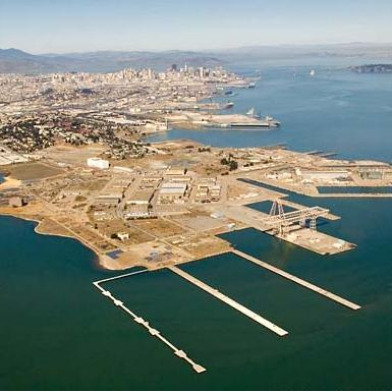 Bonner: Negotiations “Underway” for First $25 million of total $700 million needed from banks
Bonner: Negotiations “Underway” for First $25 million of total $700 million needed from banks
Many congratulatory remarks were issued Tuesday, when Mayor Gavin Newsom “officially” signed the legislation allowing for the massive Hunters Point Shipyard redevelopment project to go forward. Two words conspicuously absent from Room 200, however, were “superfund” and “financing.”
Those are the two 600 pound monsters lurking in the room, admitted Kofi Bonner, the former city staffer who has been Lennar Corporation’s frontman on the project. Until the Navy transfers the last of its property to the city — after it cleans up the superfund sites contained therein — the city can’t go to banks and ask for the loans needed to finance the construction of 10,500 homes over 702 acres.
The city will eventually need to ask banks for up to $700 million over 20 years, Bonner said, out of a total project cost of $7.7 billion.
Newsom did allude to this briefly on Tuesday, joking that “Now Kofi needs to go celebrate — but not at a bar, at a bank,” the mayor said.
That’s all down the road, as the Navy is not expected to transfer two dirty parcels — B and D — to the city until fall 2011 at the earliest, Bonner said.
“But now that we have the go-ahead (thanks to Newsom’s John Hancock), we can go ahead and take the” plans to lenders and ask for loans, Bonner said. “We can also take them to the level of detail necessary to get the further permitting required.”
That takes money, and the $700 million includes the cost of planning and engineering, Bonner said.
In the meantime, San Francisco is currently in negotiations with two lenders — CitiGroup and the AFL-CIO Housing Investment Trust — to provide an initial loan of $25 million, Bonner said. This loan will pay for construction of 85 homes on the hilltop parcels immediately adjacent to the shipyard of which the city already has ownership, he said.
“We’ve invested $130 million [in the hilltop parcels] already,” Bonner told The Appeal. “Now, we wish to start going vertical [with construction], until some blocks are completed.”
That the project is approved during one of the worst markets for liquid credit won’t eventually matter, Bonner said. “The housing market has always been cyclical,” he said.
“We believe that with the particular asset we’re talking about, it will create some extra opportunity that capital markets will look at.”









